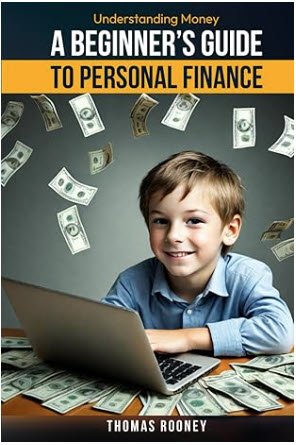If you’re a kid or a teen trying to make sense of money, you’re already ahead of most adults. Seriously. Learning money for kids early — before the real-world responsibilities kick in — gives you a massive life advantage. And the good news? Money isn’t complicated. It’s just a tool. Once you understand how it works, you can start using it to build choices, freedom, and a future you’re excited about.
This post is based on my book, Understanding Your Money: A Beginner’s Guide to Personal Finance, available here on Amazon:
👉 https://www.amazon.com/Understanding-Money-Beginners-Personal-overview/dp/B0CVPTZQDJ
Let’s break this down in a fun, simple way that makes sense at any age.
What Money Really Is (Explained Like We’re Sitting at the Kitchen Table)
Money isn’t magic.
It’s not a mystery.
It’s simply a trade — something you swap for things you want.
Think of it like this:
- A movie ticket gets you into a movie.
- A bus pass lets you ride the bus.
- Game tokens let you play arcade games.
Money is a permission slip.
It lets you trade for things — food, games, experiences, clothes, or that oversized dream item you’ve been saving for.
Once you see money as a tool, not a stressor, everything changes.
Why Learning About Money Young Is a Superpower
Let’s be honest:
Most grownups learn money the hard way — bills, mistakes, “wish I had known sooner” moments.
But you?
You’re learning before the pressure hits.
That means you’ll:
- Make smarter choices
- Set better goals
- Avoid money stress
- Have more freedom as an adult
It’s like learning to ride a bike when everyone else is still reading the instruction manual.
How Kids and Teens Actually Get Money
You might think the only way kids get money is from parents… nope. You’ve got options:
✔ Allowance
Helping around the house, completing chores, or taking on responsibilities.
✔ Small Jobs
Dog walking, mowing lawns, babysitting, and helping neighbors.
✔ Part-Time or Seasonal Work
Once you’re old enough, you can have stores, restaurants, and summer jobs.
✔ Gifts
Birthdays, holidays, or family events.
✔ Side Hustles
Kids and teens today start all kinds of mini-businesses:
- Selling art or crafts
- Reselling items online
- Helping with tech setups
- Making YouTube videos
- Tutoring younger kids
There are WAY more ways to earn money today than even five years ago.
The Three Things You Can Do With Money
Every dollar you get has three possible jobs:
1. Spend it
The fun stuff.
2. Save it
In the future, you will thank yourself.
3. Grow it
This is where money has the chance to make more money.
An excellent starting plan is the 50•40•10 Rule:
- 50% Spend — enjoy some
- 40% Save — bigger goals later
- 10% Grow — long-term power money
This system keeps things balanced without being strict or complicated.
Yes, Kids Can Have a Simple Money System
A piggy bank is a great start — but a bank account is a bigger step.
Most kids and teens can open:
A Savings Account
For money you want to keep safe and untouched.
A Checking Account or Teen Debit Card
For everyday spending and learning how to track money.
These accounts help you think like an adult — in a smart, easy, low-pressure way.
The Biggest Money Secret (That Most Adults Miss)
Here’s the truth:
It’s not about how much money you have — it’s about what you do with it.
If you get $10 a week:
- Spend some
- Save some
- Grow some
Do that consistently, and you’re already ahead of half the country.
Small habits turn into big results.
Five Simple Money Steps You Can Start This Week
Here’s your action plan:
✔ 1. Decide on your money goal
Maybe it’s a game, headphones, a bike, or saving for a car someday.
✔ 2. Choose one way to earn
Chores, a small side job, or a simple teen-friendly hustle.
✔ 3. Follow the 50•40•10 rule
Spend a little, save a lot, grow a little.
✔ 4. Talk to your parent about opening a savings account
A real bank account is your first “money milestone.”
✔ 5. Track what you earn
A notebook or notes app works perfectly.
That’s it — that’s your starter money system.
Learn More (And Support the Author While You’re At It)
If you want to go deeper, my book Understanding Your Money: A Beginner’s Guide to Personal Finance breaks all of this down in simple, kid-friendly steps.
👉 Buy it here on Amazon:
https://www.amazon.com/Understanding-Money-Beginners-Personal-overview/dp/B0CVPTZQDJ
It’s perfect for:
- Kids
- Teens
- Parents teaching kids about money
- Teachers
- Homeschool families
- Youth programs

